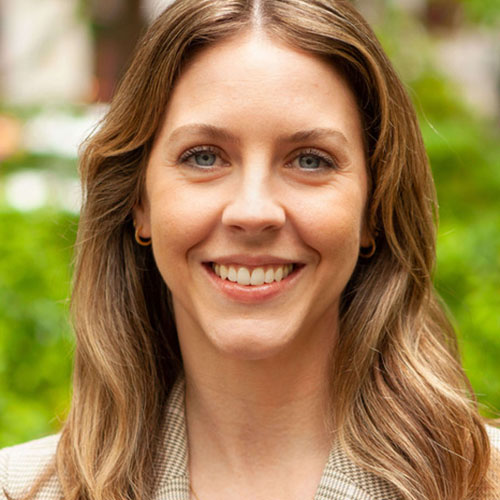Chelsea Dobleman, Esq.
Manager, Coaching and Transition Services
One of the biggest takeaways from my experience is that the skills you develop in law school or legal practice are transferrable to so many different career paths and industries. When I transitioned into the non-profit space, I found that my ability to work under pressure and be proactive contributed greatly to my success in that sector. Similarly, when I moved into career services at a top law school, I was able to lead and deliver large programs with the persuasive communication skills I honed as a litigator. In many ways, your J.D. and legal experience broaden your career options rather than limit you to any one path. I also learned that experience is the greatest teacher. Many times, we don’t know what it is we want to do or should be doing until we do it. Making pivots can be scary, and we often let this fear prevent us from acting. But the confidence and clarity you gain from pushing yourself out of your comfort zone and trying new things is invaluable and ultimately leads you to the discovery of what you are meant to do.
I have always enjoyed working with people, building strong relationships, and supporting others. I served as a mentor to 1Ls in law school and to summer associates at my firm. Those experiences ultimately inspired my move into career services at the University of Chicago Law School. I loved working with students on their job searches, but, over time, I knew I could provide additional value to practicing lawyers on their own career journeys, having walked in their shoes, and understanding the value of strong career support. After meeting with the rest of the Greiner team, and seeing the incredible work they do for attorneys, I knew this was where I wanted to be.
Absolutely. You invest three challenging years into earning a law degree and spend months studying for the bar exam, and you often have a picture in your head of what your career will look like after graduation. With all, it can be difficult to pivot, and in my case, step away from practicing completely, without feeling like you’re throwing away something that you worked so hard to achieve. What I came to realize is that law school and legal practice prepare you for so many things in life, and no matter what you end up doing with your career, those skills and experiences gained from your education and professional endeavors are never wasted.
I always make it a priority to meet individuals where they are. While some lawyers may know exactly what they want their next step to be, others may need more support brainstorming or thinking through various options. I tailor my approach based on the person and treat each client as an individual with their own set of experiences, skills, and interests. I have always prided myself on being an especially empathetic person as well, and I recognize the unique challenges someone may be facing. I want our clients to walk away from our conversations feeling seen, heard, and supported.
While I’ve always been a strong believer in the notion that we’re never done learning, the scope and pace of change across many dimensions: ESG, the emergence of AI, geopolitical shifts, and economic changes will require lawyers to possess greater agility, broader awareness, and a higher comfort level with taking risks. These scenarios present many challenges, and they also represent phenomenal opportunities to develop novel specialties, shape frontier practice areas, and design new client service models. Even with all the changes coming, lawyers can still rely on the fundamentals of their training to “meet the moment” and enjoy fulfilling and exciting careers.
I have been so fortunate to have had the opportunity to explore various career paths and learn so much about myself through that process. My optimal desired result for those that I work with is a similar chance to take a step back, identify their strengths and interests, and leverage those to find a career that is meaningful, impactful, and sustainable for them.
Most definitely! My 1L legal research and writing professor became a great mentor for me, and I ended up working as a teaching assistant for her during my second and third year of law school. Beyond my teacher, she was a mentor and ultimately a friend. She was someone who was always so encouraging, and not only did she help build my research and writing skills but also provided invaluable insight into her own career path. I am a huge proponent of finding your mentors. I encourage young attorneys, especially, to seek out people who have had their own distinctive career journey – learn where they started and follow their story to understand how they landed where they are today. Mentors and coaches are often able to point out strengths that you may not see in yourself, and you can use this information to inform your own career decisions.
My weekend can vary greatly depending on the time of year – as Chicagoans know, the city transforms right along with the seasons! For my family, Saturdays in the fall are dedicated to watching college football, whereas we spend weekends in the winter exploring museums like the Art Institute to escape the cold and snow. As soon as warmer weather hits, we try to spend as much time outside as possible: reading in the park, grabbing dinner and drinks on a restaurant patio, or catching a Cubs game at Wrigley Field. No matter the time of year, however, a few activities remain consistent, including fitting in a Pilates class on Saturday mornings and finding activities during the day to wear out my very active toddler.
